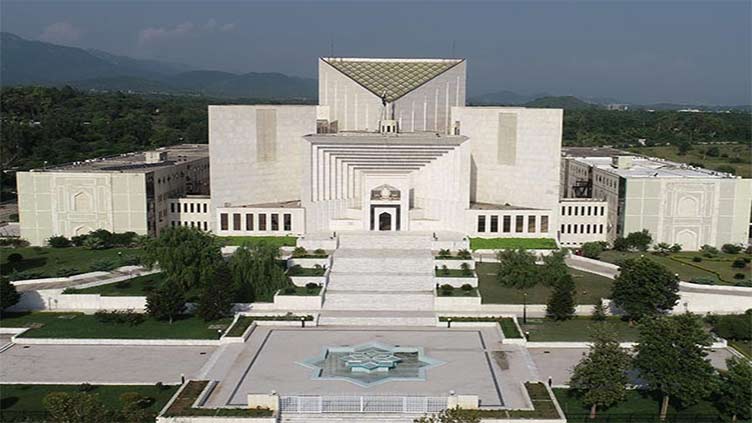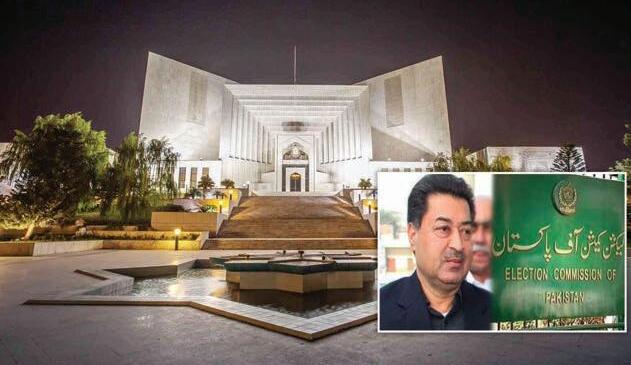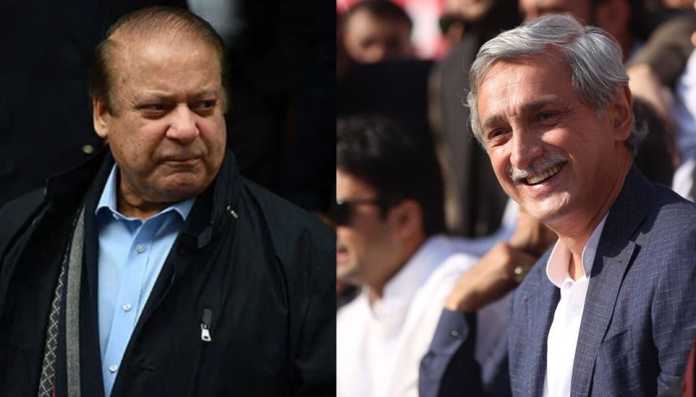
SC adjourns hearing of ECP review plea after AGP objects to bench under new law
The new law deprived the CJP of powers to take suo motu notice in an individual capacity.
A three-member bench headed by Chief Justice Umar Ata Bandial heard the case
You must have read our order on the audio leaks commission. Keep it in mind that the court didn’t declare the commission as nullified,” the CJP added.
A three-member bench, headed by Chief Justice of Pakistan Umar Ata Bandial, resumed hearing in the case. Justice Ijazul Ahsan and Justice Muneeb Akhtar are the members of the bench.
Soon after the hearing started, AGP Mansoor Usman Awan came to the rostrum and objected to the three-member bench, informing it that the Supreme Court (Review of Judgements and Orders) Bill 2023 had become law after the president’s assent.
The new law deprived the CJP of powers to take suo motu notice in an individual capacity.
AGP Awan stated that after the president’s assent, the bill has become a law. “Under the new law, the review and appeal are the same now.”
He said that the review could only be heard by a larger bench and raised objections to the bench.
Justice Muneeb Akhtar remarked that “the ECP lawyer has a smile on his face after hearing about the bill.”
CJP Bandial said that the apex court would be resuming its hearing on a set of petitions moved to challenge the government-appointed judicial commission to probe audio leaks. “Seek instructions from the government in this regard as well.”

“You must have read our order on the audio leaks commission. Keep it in mind that the court didn’t declare the commission as nullified,” the CJP added.
He said that the court also had to protect the freedom of the judiciary.
The ECP filed a review petition on May 3 on the Supreme Court’s April 4 order.
In its 14-page petition, the ECP argued that the judiciary does not have the authority to fix the dates of elections. It argued that the court disregarded its constitutional jurisdiction.
The ECP claimed that the Supreme Court’s review was necessary to correct an error that is against the constitution. It accused the apex court of overstepping its boundaries and transgressing its powers.
In an unequivocal verdict delivered on April 4, the bench unanimously nullified the ECP’s decision to postpone the elections in Punjab from April 10 to October 8. Instead, the court set May 14 as the new date for the elections.
The court also directed the federal government to allocate Rs21 billion for the elections in Punjab and Khyber Pakhtunkhwa. The court ordered provision of a comprehensive security plan for the upcoming elections.
The Supreme Court Review of Judgments and Orders Act 2023 became law and raised hopes for Pakistan Muslim League Nawaz (PML-N) supremo Nawaz Sharif and Pakistan’s prominent businessman Jahangir Tareen, ARY News reported on Monday, quoting legal experts.
According to legal experts, the President of Pakistan, Dr. Arif Alvi, has ratified the Supreme Court Review of Judgments and Orders Act 2023, after which it passed into the law, which allowed PML-N supremo Nawaz Sharif and Jahangir Tareen to file review plea over the sentence imposed on them.
It is worth mentioning here that on May 8, the Supreme Court Review and Judgment Order Bill, which was approved by the National Assembly and Senate, was sent to President Arif Alvi to be formally passed into the law.
Under the said bill, under section 184/3, any accused person can exercise the right to review the sentence imposed on them in previous decisions.

Article 188 of the Constitution empowers the Supreme Court, subject to the provision of any Act of Majlis-e-Shoora (Parliament) and any rules made by the Supreme Court, to review any judgment pronounced or any order made by it.
According to the statement of the objects and reasons of the bill, it is necessary to ensure fundamental rights to justice by providing for meaningful review of judgments and orders passed by the Supreme Court in exercise of its original jurisdiction under Article 184.
The bill states that in case of judgment and orders of the supreme court in exercise of its original jurisdiction under Article 184 of the Constitution, the scope of review on both facts and law, shall be the same as an appeal under Article 185 of the Constitution.
It proposes that a review petition shall be heard by a bench larger than the bench which passed the original judgment in order. It suggests that the review petitioner shall have the right to appoint any advocate of the supreme court of his choice for the review petition.
The bill states that the right to file a review petition shall also be available to an aggrieved person against whom an order has been made under clause (3) of the Article 184 of the Constitution, prior to the recommendation of this legislation. It suggests the petition shall be filed within sixty days of the commencement of this legislative piece.
It asks that a review petition may be filed within sixty days of the passing of the original orders. It states that this legislation shall have effect notwithstanding anything contained in any other law, rules or regulations for the time being in force of the judgment of any court including the supreme court and a high court.

